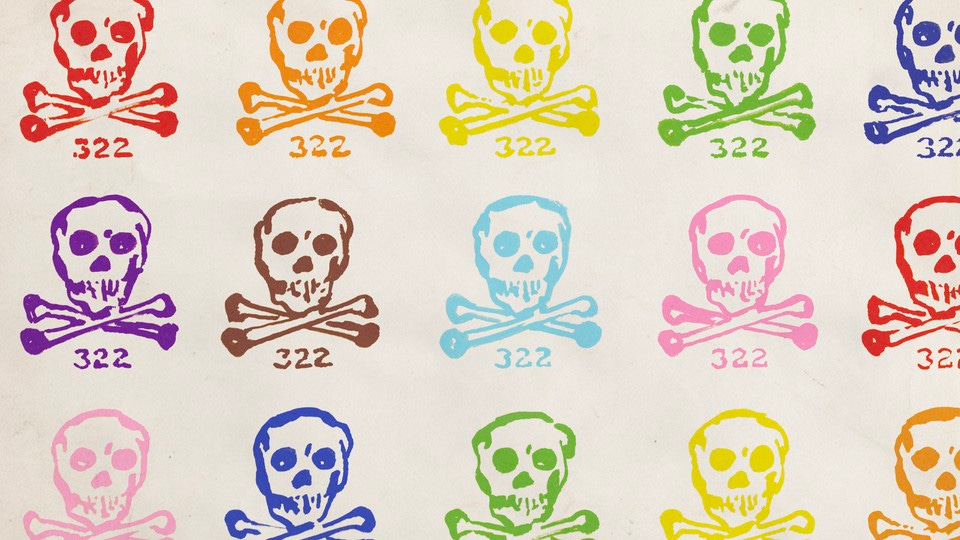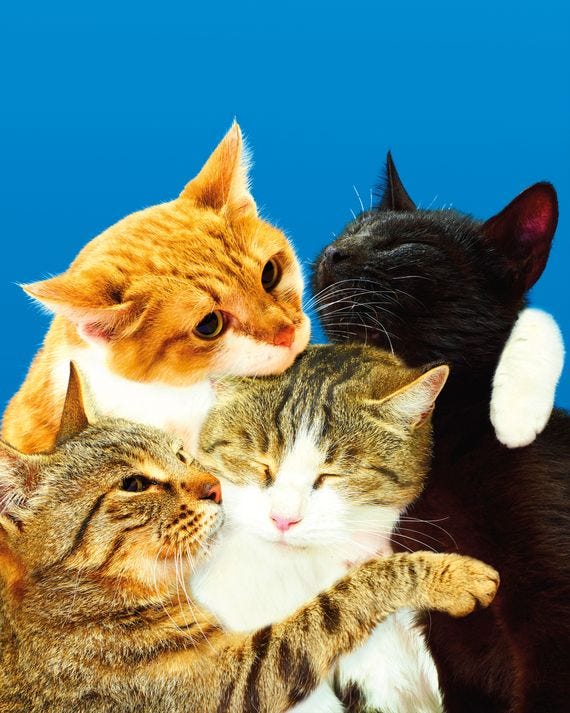The Bluestocking, vol 302: Secret societies, extra boyfriends
Sarah and Nick share a calendar
Happy Friday!
Hope you’re keeping warm. I now live in these Thermal Trousers that
recommended.Helen
Skull And Bones And Equity and Inclusion (The Atlantic)
Reports of alumni-student schisms within Yale’s secret societies are nearly as old as the societies themselves. Every decade or so, especially when a member of the Bush family runs for president (George H. W. Bush was also a member), opinion writers argue that left-wing students have trampled the values that sustained societies. That makes it easy to miss a much more significant shift within these groups. Picture a member of Skull and Bones, or any of the other Ancient Eight secret societies, and you’ll probably conjure a preppy white guy who summers on the Cape. In fact, in recent years, the demographics of Yale’s most elite organizations have been utterly transformed. In 2020, Skull and Bones had its first entirely nonwhite class. (Every year, the society admits around 15 rising seniors; selections must be unanimous, and members have final say.) Many of the societies now have only one or two students each year who aren’t from historically marginalized groups.
Absolutely cracking story about the diversity drives at Yale’s secret societies. Skull and Bones has a $17m endowment and a private island, and in 2020 got its first entirely non-white cohort. Props to the kid who once wrote an essay entitled “Abolish Yale” and is now a member of Skull and Bones for being honest: “Once you get a tap for a society, it’s funny how quickly you get invested in the preservation of that society.”
Meet A Polycule (New York magazine)
For Nick and Sarah, the relationship design looks like this: Nick and Sarah are married. Sarah has had multiple other committed relationships while married to Nick. Currently, Nick has a girlfriend, Anna, who has a husband, Alex — all the names in this story have been changed to protect their privacy — and Alex has other people with whom he explores his desires.
[…]
The easiest way to explain all of this might be in the love language of most ethically non-monogamous people: Google Calendar. Sarah and Nick share a calendar. Nick and Anna share a calendar. Alex and Anna share a calendar. Sarah and Anna do not share a calendar but are aware of who has Nick’s time on any given day; same for Nick and Alex. They are Sarah and Nick and Anna and Alex, a modern polycule, living, laughing, loving, and doing a lot of therapy.
Middle-aged (adj.): When you read about polygamy and you’re mostly jealous of . . . all the free time these people seem to have.
Quick Links
“A certain pragmatic flexibility has always characterized the British monarchy. Royal line ended? Send for the nearest German. King gone mad? Get a regent in.” I did a fun little piece about an Atlantic archive article from 1935, on why Britain loves the monarchy.
“The problem is that actually we DO badly need to know why [Paula] Vennells behaved the way she did. Imagine for a moment the Christmas Carol as told through the character not of Scrooge but of Bob Cratchit.” David Aaronovitch asks the same question I asked Private Eye’s Richard Brooks: why did the Post Office execs sign off on brutalising Mr Bates et al? (You can hear Richard’s answer here.)
The framing of this New Statesman piece about JK Rowling’s nastiness is very whack—these are crime novels, of course they’re full of bad people; plus we can all feel the writer’s desperation to mention her views on gender as the origin of her recent alleged descent into evil. But but but . . . that said, there’s lots of other acute criticism in there: Rowling is a bit like Dickens, or Russell T. Davies, in that she isn’t afraid to paint emotions and morality in bold strokes. Like both of them, too, she can depict extreme cruelty in her narratives while remaining popular because she’s also at ease with sentimentality (“You’re a wizard, ‘Arry”.)
“As the middle aged viewer on the sofa, it’s also a series about finding satisfaction in acceptance.” Sarah Ditum rewatches Our Friends in the North (Tox Report).
Personally, I am currently watching The Traitors (people who think they are unusually good at “reading people” being proved wrong) and Reacher (absolute tank of a man punches wrong ‘uns in the Deep South). Highly recommend both.
My colleague Derek Thompson on how a “need for chaos” explains Trumpism. I had mentally formulated this a different way, which was that some people have very comfortable lives and are a) complacent about whether anything REALLY bad could happen in their country; and b) a bit bored by that.
“Their elaborate schemes included hiring ex-MI6 operatives to spy on “remainers”, running a “mole” in the civil service, providing secret briefings to prime minister Boris Johnson on the dangers of Chinese telecoms company Huawei, and trying to convince the government to put the editors of a leading science journal under state surveillance.” This Computer Weekly story about the ex-head of MI6 (now a GB News pundit) and his secret email group of Brexiteers is bananas. I miss the days when retired people would just volunteer at National Trust properties as God intended.
See you next time!





re: Trumpism & the need for chaos. I realise citing Snow Patrol lyrics as a source of profundity marks me out as terminally middle-aged and middle of the road, but there's a line in one of their songs that always stood out to me: "Sometimes I want to be the car crash, not always just the traffic jam." I sort of get that: even if the thing happening is crappy, sometimes there is that desire for something to happen, as long as you're at the centre of it. I think Trump makes his supporters feel like the centre of things.
Comment about free time and polycules - yes! this is my point! To be fair, I have mainly been talking about cheaters who have multiple other women on the go. Leaving aside the moral implications, who has the time or energy for that?